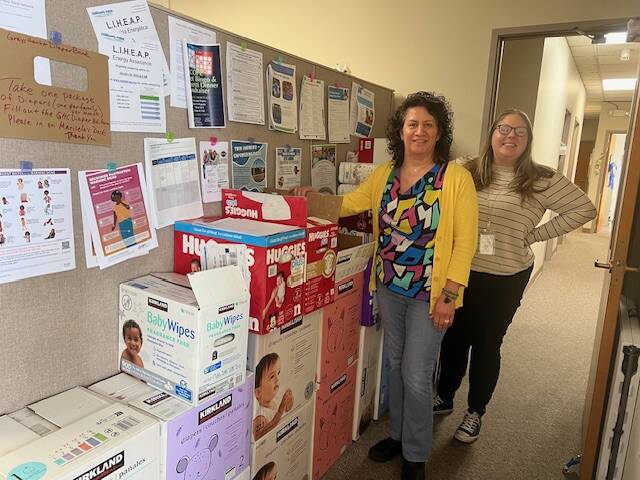As costs rise for groceries and rent, families with young children are forced to cut from their daily budgets to come up with enough cash for an unavoidable purchase: diapers.
After the expiration of a pandemic-era diaper bank resource a few months ago, a network is being built to distribute diapers across Grays Harbor and ensure families aren’t forced to choose between essential needs.
The network, spearheaded by Grays Harbor County Public Health, loops in local groups with hopes to reach families in far corners of the county as well as the central Harbor.
“Across our whole county — outside of maybe some programs here and there who might get some small donations of diapers — we don’t have any place that consistently is able to provide diapers to people,” said Erin Schreiber, who manages the health department’s family division and is coordinating the new diaper bank network.
“We need to be able to get the supplies to the people where they’re at, rather than only relying on them coming to us,” she added.
Schreiber said the county has worked for about six months on the project and has been engaged in getting diapers to the public for several years. After launching three weeks ago, the network has dished out diapers to 17 families, and will distribute as many as funding allows, Schreiber said.
Drawing from a $5,000 grant from the Grays Harbor Community Foundation, the network is working with partners like Coastal Community Action Program in Aberdeen and the Early Steps to School Success program in Pacific Beach, which operates under the charity Save the Children.
A public health analysis from last year showed the Pacific Beach area, along with Elma, are the fastest growing areas of young children in Grays Harbor County.
But even as a whole the county has a hard time getting access to bulk diaper deals at wholesalers, said Marie Brain, a specialist with South Sound Parent to Parent, a regional childhood service provider.
During the pandemic, the agency received a state grant to run a diaper bank in Aberdeen. Since that funding ran out recently, parents have called the office consistently asking if diapers are available, Brain said.
“It’s hard, because we know it’s such a need,” she said. “I’m so thankful that a diaper bank is coming back to the area.”
A 2023 report from the National Diaper Bank Network found nearly half of American families reported a need for some kind of diaper supplies. Washington state created a program to add diaper money to federal food assistance benefits, a program that began in 2023.
But sometimes parents with children over three years old who aren’t yet potty-trained miss out, Brain said. She said a key to the new network will be facilitating all types of diaper sizes.
“It’s expensive, and it’s not like you have a choice,” she said. “The child has to wear a diaper.”
Children whose diapers aren’t changed regularly can be exposed to immediate health risks. Providing diapers addresses those immediate risks, but access to diapers is also a “protective factor” for preventing other negative health outcomes down the road, especially for families in poverty, Schreiber said.
As diapers are delivered to families, it’s also a chance for public health workers to connect them to other resources.
“We can get them connected to other resources and programs that maybe they wouldn’t have known about otherwise,” Schreiber said.
Schreiber said there are plans to run an upcoming diaper drive at local businesses to stretch the network’s resources.
Contact reporter Clayton Franke at 406-552-3917 or clayton.franke@thedailyworld.com.


